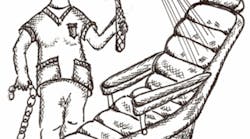Dear RDH:
I recently contemplated writing a letter to our state board of dentistry regarding the restorative functions of dental hygienists, but I was apprehensive about going through with sharing my opinion. I decided a better mode of discussing this issue might be to share my thoughts with my colleagues. I realize I am going out on a limb in expressing my opinion, and that likely many hygienists will not agree with me. However, I respect RDH magazine for having an open forum where one can communicate an opinion in what I feel to be a “safe” environment.
I feel compelled to speak up about the restorative functions of dental hygienists and assistants. Our state board of dentistry has adopted restorative functions of dental hygienists, and I received a Notice of Proposed Rule-making Hearing for November indicating that they are now considering adopting a rule for dental assistants to perform restorative functions.
First let me say that I have neither the time, desire, nor energy to expand my functions to include restorative dentistry. I honestly believe that my skill and expertise as a hygienist are better served treating the periodontal needs of my patients. In the dental practice where I work, we see many new patients, many of whom require initial therapy/nonsurgical periodontal therapy. I would say that probably 50 percent of the patients I see are periodontal maintenance patients (and probably more should be). I feel fortunate that my employer has the faith in me to treatment plan for dental hygiene services, treat, monitor, and continually reevaluate their condition, as well as recognize and report other dental disease.
I am also a dental hygiene instructor at a community college. I often feel that two years is not long enough to prepare students for working in dentistry! Certainly it prepares them to pass the board examinations, but proficiency in dental hygiene skills (i.e., periodontal scaling, maintenance, working with children, communication, education of patients on disease and prevention) takes time and experience after obtaining a dental hygiene license. I feel that adding restorative functions to the mix has the potential for taking away the quality of the type of skills we are trained to perform. Experts say that periodontal scaling and root planing requires a high degree of skill and finesse, and I feel that dental hygiene students need as much practice in this area as possible before they go into practice.
My understanding is that the purpose of the board is to protect the public. Quite frankly, as a consumer I would not feel comfortable trusting the auxiliary to place a restoration, and I would not feel that I was receiving quality dentistry. A dentist has far more years of dental education than dental assistants and many hygienists when you compare a minimum required eight years of higher education a dentist has. The auxiliary takes a two-week course and all of a sudden he/she is qualified to perform restorative dentistry. As expensive as dentistry has become, I feel this undermines the perceived value of the treatment being rendered. I hear reports of patients saying that in some dental offices they feel like they are in an “assembly line.” Imagine going into a dental office where the dental hygienist anesthetizes the patient, the dentist prepares the tooth/teeth, and then yet another person (the dental assistant?) comes in and places and finishes the restoration. The patient must consent to having the auxiliary place the restoration, and then the dentist must come and check the final restoration. Wow, talk about an assembly line. I really think that this type of treatment will only perpetuate the public’s distrust of dentistry and health care.
Our local newspaper had an article recently about dentistry in the United States. It said that dentists’ fees are rising faster than inflation, and that with more than 100 million people without dental insurance that the percentage of Americans with untreated decay is increasing, reversing the previous trend of improvement of dental health. It discussed that poor and lower-middle class families do not receive adequate care partly because most dentists want patients who can pay cash (often full payment at the time of service), or have private insurance.
One dentist interviewed said that dentistry has become a business, rather than the practice of dentistry [providing a health service]. Access to care is a professional issue that is important to many hygienists, and they want to assist in access to care, but bureaucratic and legal barriers prevent us from doing so. It seems to me like expanding our functions to include restorative under the dentists’ supervision just adds another task to our plate that is already full, while the dentist pockets the money for our hard work.
In some ways, I suppose I have very mixed feelings about this expanded function. While I am all for self-regulation, expanded practice settings, and removing the restrictive supervision barriers that we have in order to increase access to care, I am not sure how allowing this function (under fairly strict supervision) promotes these philosophies. I can see one advantage to this duty for those hygienists who perhaps feel disillusioned with traditional dental hygiene care and feel “burned out.” Placing and finishing restorations might help them out of that complacency rut and may not be as taxing ergonomically as debridement procedures.
I think we need to take a different approach and realize that we need each other (dentists and dental hygienists). We should work as a professional team with separate but important roles; like yin and yang, complementing each other’s skill and area of expertise. I hear many dentists say that they enjoy performing restorative dentistry, and that they would not want their auxiliary performing this function for them. As a hygienist, if I wanted to perform restorative dentistry, I would have gone to dental school! Hygienists are certainly not going to become more independent by adding this function to their duties.
I realize I am taking some risk in sharing my opinion, and likely many dentists and hygienists will not share my views, but for what it is worth — that is my two cents!
Tamara Maahs, RDH, BSDH
Springfield, OR
Dear RDH:
I am responding to the letter from Debra Miller in the August 2007 issue about her experiences with a “foreign dentist.” Her letter was in response to the article in the April 2007 issue which spoke of foreign-trained dentists taking over dental hygiene jobs in Florida. According to her account, a “foreign dentist” had just moved here, could barely speak English, her husband had insurance through his job, and the “foreign dentist” was preferentially hired over Ms. Miller. Some important points seem to have been left out, and I would like to clarify the situation.
I happen to know the “girl” from China. This woman is indeed from China and has a dental degree from Xi’an Medical University Dental School. She practiced and taught dentistry in China for nine years prior to moving to the United States. She, with her husband and son, moved to the United States six years prior to the event in question, and are here with green cards. Both she and her husband learned to speak English. Is it perfect? No. But both of them are readily understood and constantly striving to improve. Most importantly, because she was foreign trained, she was not able to work as a dentist in the United States.
Therefore, she went to the local community college and collected the associate’s degree in dental hygiene. I was one of her instructors and can attest to the hard work and dedication she demonstrated during the two years of the program. Not only did she do well in the classroom (member of Phi Theta Kappa), she always had patients, and generally difficult ones, as she was always up for a challenge. Licensure in Florida required her to take both the national board exam and the state exam just like every other hygienist who wants to practice in Florida.
Although I sympathize with Ms. Miller’s medical and insurance issues, I do not see how the need of benefits is a criterion for employment. An applicant with dental and dental hygiene degrees and years of dental experience may well be the better applicant.
With all the talk recently over illegal immigration, foreignors not learning to speak English, and immigrants on welfare, it is distressing to read comments that dismiss the efforts of those who emigrate to this country like most of our ancestors did. I thought the point was to come legally, learn English, become educated and get a job, start to pay taxes, and contribute to the country.
Ms. Miller asks, “What gives women the right to take jobs away from men?” The answer then is the same as now. Every person has the right to life, liberty, and the pursuit of happiness as long as they do so legally. This includes the right to work. Our country is based on those principles. Legal, educated, qualified, English-speaking men and women, Chinese or otherwise, based on merit, have the right to work just as Ms. Miller does. This is both fair and just.
Deborah McEdward, RDH, BS
Gainesville, Florida
Dear RDH:
I have been a dental hygienist for 26 years. I am currently not practicing in a dental office, but I read your magazine to try and keep up on the latest information available to our profession.
I am compelled to write to the Readers’ Forum concerning ultrasonic vs. hand scaling. Years of experience have convinced me of the importance of proper and thorough hand scaling. In my opinion, this cannot be replaced by ultrasonic scaling. I certainly hope that students who are currently studying in dental hygiene schools are also taught the importance of hand scaling. The future of dental hygiene depends on it!
Proper instrument technique is important in removing calculus and plaque, and reducing patient discomfort at the same time. It is well worth the time taken to teach hand scaling to students who are there to learn! Let’s pass on our knowledge to the benefit of the dental hygiene profession and the benefit of the patients.
Jean Marie Unger, RDH, BS
Southgate, Michigan







